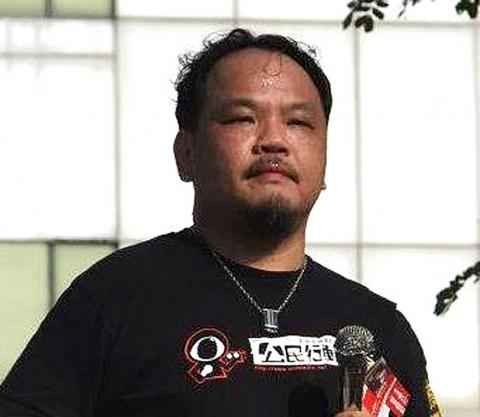|
FEATURE: Media need
to reform ‘to let all voices be heard’
LEST WE FORGET: Social activism does not get
fair coverage, and civic and non-governmental bodies should make media reform
their top priority, a veteran activist said
By Chen Hsiao-yi and Jake Chung / Staff reporter, with staff
writer

National Chung Cheng University
associate professor Kuang Chung-hsiang attends a protest in an undated
photograph.
Photo provided by Kuan Chung-hsiang
In all his years of social activism,
nothing had been more shocking to him than his first experiences in 1988, when
he first felt that the mainstream media’s portrayal of social activism was not
truthful and indeed often maligned such activities, National Chung Cheng
University associate professor Kuang Chung-hsiang (管中祥) said.
Kuan said his civil media archive project initiated six years ago has helped
students record more than 1,500 pieces of news.
“It is an effort to preserve the real sounds and actions of the civic activities
that have been passed by, or misrepresented, by the mainstream media,” he said.
Media reform is not just about changing the current circumstances of the media
industry, it is also about letting society’s diverse voices be heard in order to
have more dialogue, Kuan said.
Unwilling to become simply an academic that talked of grandiose schemes, but did
not turn them into reality, Kuan said he took part in numerous protests and
rallies appealing for media reforms, and had also worked closely with civic
organizations during the six years when he was president of Taiwan Media Watch.
Giving an example of his actions, Kuan singled out an incident in 2006 when the
organization protested the headline of an article in the Chinese-language United
Daily News for discriminating against psychiatric patients.
“We hired buses to transport patients and staged a protest in front of the
United Daily News building, and though the news company did not apologize, the
protest prompted organizations for physically handicapped individuals to
pressure the Legislative Yuan into amending the People with Disabilities Rights
Protection Act (身心障礙者權益保障法) and write into law anti-discrimination regulations
for the first time,” Kuan said.
“I was very happy that day, because my efforts had helped people regain their
rights, and it also shows how citizens truly have [the] power [to affect
government policy],” he said.
Media reformation is only a means to an end — a way to implement basic
democratic values such as social diversity and promote social equality, to let
people see each other for what they are and accept each other, Kuan said, adding
that civic organizations and non-governmental organizations needed to make media
reform a top priority.
Without media reform, organizations’ voices and opinions cannot be heard, and
thus society will not advance, hence leading to an undemocratic society that
speaks in a monotone, Kuan said.
In order to implement his ideals, Kuan works with the civil media archive so
that social activists may rest assured that their activities would not be edited
out and left to be forgotten.
“Today’s news is tomorrow’s history, but while the mainstream media records the
history of prominent figures and significant issues, civilian history is being
ignored,” Kuan said.
For example, he said, in the 80-second TV news coverage of the massive protest
on Aug. 18, during which protesters held an overnight demonstration in front of
the Ministry of the Interior building in Taipei over its handling of the Dapu
Borough (大埔) incident, almost every news channel only replayed footage of how
students climbed over the walls, how they pushed against the police or how
Deputy Minister of the Interior Hsiao Chia-chi (蕭家淇) was drenched in water, Kuan
said.
However, there was not one channel that reported on the footage of how the event
organizers asked participants to lower their voices and not to shout slogans in
fear of disturbing patients in the nearby National Taiwan University Hospital,
he said.
“Civil media archives recorded those scenes and preserved the chance for all
sides of the story to be heard by society,” Kuan said.
According to Kuan, the archive is only able to hire two full-time staff who are
tasked with both editing and filming, adding that he hopes to raise more funds
so special correspondents can be hired to work with the archive in central and
southern Taiwan.
“The media needs to be reformed and society needs to be reformed, but this
cannot just be a solitary effort by media organizations and civilian
organizations; it’s an effort that must involve every citizen,” Kuan said.
“We also hope to spread our knowledge to more civilian organizations and in the
process churn out more citizen reporters — reporters who will be able to record
the true voices of civil society,” Kuan added.
|
![]()
![]()
![]()